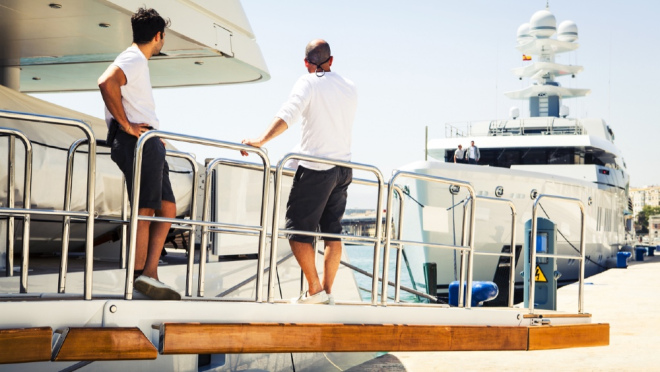Routines, story-telling and belly-laughs turn out to be the best prescriptions for surviving boredom and anxiety in extremely tight quarters.
While the charter market remains frozen in the grips of coronavirus, many captains and crews are confined to their yachts because of port restrictions or, in some cases, the inability to find a country that will take them in. The inevitable boredom and anxiety that many crew members are experiencing could be similar to what many readers are going through these days. Robb Report reached out to captains and crew to get their best coping strategies.
“I’ve had 30 years of lockdown,” laughs Brendan O’Shannassy, an experienced captain of multiple 300-foot-plus yachts and founder of yacht consultancy Katana Maritime. “What the world is dealing with now is akin to what maritimers live and breathe every day. Lockdown is our normal.”
O’Shannassy began seafaring at the age of 17, but even crew with far less experience at sea can teach landlubbers a thing or two about how to get through indefinite Covid-19 confinement. As a member of the International Seafarers’ Welfare and Assistance Network (ISWAN), O’Shannassy remains in regular communication with active crew, all of whom are affected by the corona pandemic.
Large crews need routines, unscheduled celebrations and exercise during quarantines, says Capt. Brendan O’Shannassy, who skippered this large crew of the 318-ft. Vava II. Capt. Brendan Shannassy
“Last week a group of 16 crew called in to have a share session on how they’re all getting on,” O’Shannassy told Robb Report. “It was the ‘you’re not alone’ conversation. We’ve had 40-plus crew at anchor in Mexico unable to step off the yacht, a yacht in the Caribbean trying to find a nation that will take them, and one in Viareggio confined to their crew house.”
They have all been trying to find solutions to deal with boredom and the unknowns for their immediate future.
“We have no idea how long the lockdown will last, but whether you’re on land or sea, routine is key,” says O’Shannassy. “Bad and good habits are just a choice. Pick the habits you want and repeat them, because they will get you through. Seafarers have an abundance of time, so it’s about training yourself to slow down, and stretch out the routines that you enjoy.”
O’Shannassy also warns to be “careful of the cookie cupboard—don’t eat from boredom,” and to create a calendar of events. “We have celebrated Christmas midyear on board a yacht before, and Ocean Sundays are probably the most common one where we fabricate a Sunday to boost crew morale. I have also assigned each crew members a ‘crossing project.’ It actually doesn’t matter what the topic of the project is—anything from an inventory of breakages or doing up the tender to learning how to cook or grow vegetables—the point is that you take ownership of something.”

The six-person crew of Asolare come together in the morning to do yoga and then eat dinner together to share stories of their day, with no phones allowed.
For Bilgehan Köse, chief engineer on board Shaha, which is home-ported in Malta, his daily tasks include checking the generators, main engines, separators, fuel transfers and water makers, but he also pushes himself to reach 10,000 steps a day. “I start stretching myself in bed and then go to deck and walk around the yacht,” he says. “There are a lot of steps on board that I make a point of going up and down.”
All six crew on board 154-foot sailing yacht Asolare, which recently completed five months of back-to-back charters in the Caribbean, come together each morning for yoga, and again at lunch and dinner (with no phones allowed at the table) to share stories about their day. Chief stewardess Kylie de Vlieg also recommends having a personal checklist.
“My list contains something for my mind, body, heart and health, and I do one of each thing a day to keep me going,” she explains. “Mind activities can be listening to a podcast or doing an online course that will stretch me further than my workday, while something for my heart can be baking, reading or calling my mum. It just pushes me daily to do a little bit more and keep my mental health strong.”
The captains say that exercise, both gentle and strenuous, is also a way of moving positively through the day. Adobe Stock
Michael Schueler, captain of a 70m yacht currently at port in Fort Lauderdale, supports the theory of using surplus time as a means of personal growth. “Use the opportunity to focus on career path choices, or to go over finances in detail,” he says. “If you have a lousy credit rating, find out why and what you can measurably do over the next two to five years to greatly improve it. I show crew IQ tests, EQ tests and personality tests online to find out their strengths and what they could possibly improve on.”
Schueler says the current crisis can provide opportunities. “Time is the one thing most of us don’t have, so now that we do have it, use it wisely,” he adds.
Humor is Schueler’s ace card for times like this. “Spend time each day with every single person and get them to smile and laugh about something,” he encourages. “Be as silly as you need to be, and you will be amazed how one good belly laugh can lighten the mood.”

Bilgehan Köse (front), chief engineer on board Shaha, does his daily systems checks but makes sure to take the longest routes and most stairs to get to them. He aims to walk at least 10,000 steps per day in the confined space of the yacht.
by JULIA ZALTZMAN






